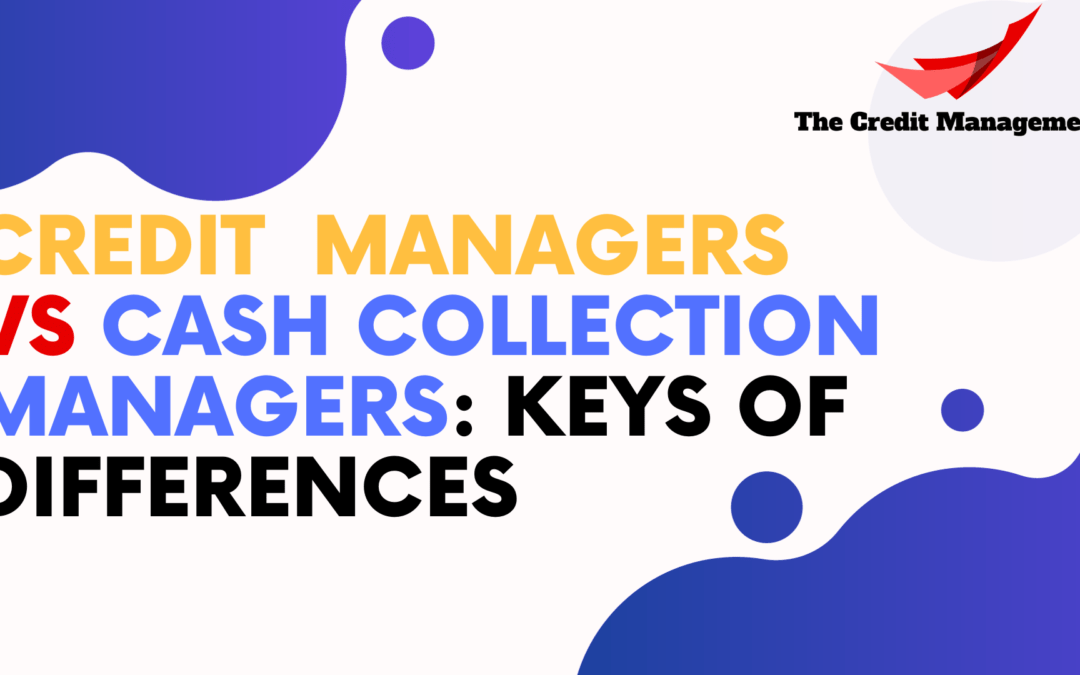INTRODUCTION:
Hello there! 🌟 Ever wondered about the unsung heroes behind the scenes of finance? Well, today, let’s unravel the mysteries surrounding two crucial roles in the financial world – the Credit Manager and the Cash Collection Manager 🎩💼
Join me on this journey as we explore the keys of difference between these two essential players in the financial orchestra. So, grab your coffee, get comfy, and let’s dive
where credit management and cash collection meet! ☕💰
Credit Managers and Cash Collection Managers take center stage, each performing a unique set of moves. Think of them as the dynamic duo responsible for maintaining the delicate balance between granting credit and ensuring timely payments. 🤝💳
Our Credit Manager, equipped with a financial compass, navigates the terrain of risk assessment, deciding who gets the green light for credit and who needs a bit more financial scrutiny. It’s a bit like being a financial detective, sifting through clues to ensure that the company’s funds are in good hands. 🔍💼
On the flip side, our Cash Collection Manager is like the smooth talker of the financial world. Armed with diplomacy, he works closely with clients to ensure that the payments roll in as smoothly as a Sunday morning jazz tune. Late payments, be gone! 💸🎶
But the real magic lies in understanding how these roles complement each other. The Credit Manager sets the stage by making informed decisions on who to trust with credit, while the Cash Collection Manager takes the reins to ensure that the company’s cash flow remains a steady, rhythmic heartbeat. 💓🎭
I. The Credit Manager: Architect of Trust

Trust is the cornerstone of any business relationship, and the Credit Manager is the architect of this trust. Picture them as the gatekeepers, carefully scrutinizing the financial credentials of potential clients before the business relationship takes flight. The primary goal? Mitigating risk.
Key Responsibilities:
- Credit Risk Assessment: The Credit Manager diligently assesses the creditworthiness of clients. This involves analyzing financial statements, credit reports, and payment histories to gauge the likelihood of timely payments.
- Establishing Credit Policies: Crafting and implementing credit policies is another feather in the Credit Manager’s cap. This involves setting credit limits, payment terms, and conditions that strike a balance between fostering client relationships and safeguarding the company’s financial health.
- Relationship Building: It’s not all about numbers. Building and maintaining relationships with clients is paramount. The Credit Manager acts as a liaison between the finance department and clients, ensuring that both parties are on the same page.
- Monitoring and Reporting: Continuous monitoring of client accounts is essential. The Credit Manager keeps a watchful eye on payment patterns and, if needed, generates reports for the higher-ups, providing insights into the financial health of the client portfolio.
Credit Managers are akin to financial architects, carefully constructing a framework that supports the edifice of trust. Their role extends beyond mere number-crunching; it involves a delicate balance between financial acumen and interpersonal skills.
Credit Managers play a pivotal role in the economic ecosystem. Their discerning eyes sift through the labyrinth of financial data to unearth patterns and insights. Through a meticulous credit risk assessment process, they navigate the intricate terrain of creditworthiness. Analyzing financial statements, credit reports, and payment histories, they gauge the pulse of a client’s financial health. This, in turn, becomes the compass guiding decisions on credit limits and payment terms.
Crafting and implementing credit policies is a strategic art form mastered by the Credit Manager. These policies aren’t just a set of rules but a nuanced instrument that harmonizes the need for revenue with the imperative of risk mitigation. It’s about creating a symbiotic relationship where the client flourishes, and the company remains resilient.
Yet, the role of the Credit Manager transcends the confines of boardroom analytics. They are diplomats, forging connections that extend beyond the balance sheet. Building and nurturing relationships with clients are essential components of their portfolio. The Credit Manager acts as a bridge, fostering clear communication and understanding between the finance department and clients. In doing so, they ensure that the financial relationship is not merely transactional but built on a foundation of trust and mutual benefit.
vigilance is paramount. The Credit Manager is, therefore, a vigilant custodian, keeping a watchful eye on the ebb and flow of payment patterns. This continuous monitoring isn’t just a preventive measure; it’s a proactive stance towards maintaining financial health. In instances where intervention is required, the Credit Manager becomes a storyteller, presenting insights through reports that illuminate the narrative of the client portfolio.
In the grand tapestry of business, the Credit Manager is the weaver of trust, entwining threads of financial prudence, strategic foresight, and interpersonal finesse. Their role, often unseen but undeniably crucial.
II. The Cash Collection Manager: The Financial Detective

Once the trust has been established and credit extended, the baton passes to the Cash Collection Manager. Think of them as the financial detectives, tracking down payments and ensuring that the company’s cash flow remains robust.
Key Responsibilities:
1.Invoice Management: The Cash Collection Manager takes charge of the invoicing process, ensuring accuracy and timeliness. This involves sending out invoices promptly, tracking their status, and addressing any discrepancies.
2.Payment Follow-Up: Chasing payments can be akin to solving a mystery. The Cash Collection Manager follows up with clients on overdue payments, employing a delicate balance of persistence and tact to maintain positive relationships.
3.Dispute Resolution: Disputes over invoices or payment terms are not uncommon. The Cash Collection Manager plays a crucial role in resolving these issues amicably, ensuring that both parties remain satisfied.
4.Cash Flow Forecasting: Anticipating future cash flows is essential for sound financial planning. The Cash Collection Manager contributes to this by providing insights into expected payments and potential delays.
III. Bridging the Gap: Collaboration is Key

While Credit Managers and Cash Collection Managers operate in distinct spheres, their efforts are intrinsically linked. A seamless handover from one to the other ensures a fluid and efficient financial cycle.
Communication is the glue that holds this collaboration together. Regular and transparent communication between these two roles is imperative. The Credit Manager provides valuable insights into the creditworthiness of clients, while the Cash Collection Manager feeds back on payment trends and client responsiveness.
Effective collaboration between the Credit Manager and Cash Collection Manager is essential for maintaining a healthy financial ecosystem. As financial detectives, their collaboration forms a dynamic partnership that sustains the company’s fiscal well-being.
Credit Management and Cash Collection are two sides of the same coin in the financial realm. While the Credit Manager evaluates and establishes trust with clients, the Cash Collection Manager ensures that this trust is upheld through vigilant monitoring of payments.
Timely and accurate invoicing sets the stage for the Cash Collection Manager’s mission. They meticulously manage the invoicing process, guaranteeing that each transaction is documented with precision. This attention to detail is not just about financial accuracy; it’s about fostering a transparent and reliable relationship with clients.
In the pursuit of payments, the Cash Collection Manager becomes a tactful pursuer. Like a detective working on a case, they delicately balance persistence and professionalism when following up on overdue payments. This approach is crucial in maintaining positive client relationships, recognizing that the goal is not just to collect cash but to preserve the partnership.
Dispute resolution is another challenge that the Cash Collection Manager confronts. In the world of finance, disagreements are inevitable. Here, the manager’s role is akin to a mediator, ensuring that disputes are settled amicably, safeguarding the client relationship and the company’s financial interests.
Looking ahead is a vital aspect of financial management. The Cash Collection Manager actively contributes to cash flow forecasting, providing insights into expected payments and potential delays. This proactive stance enables the company to navigate financial uncertainties with greater resilience.
The bridge between Credit Management and Cash Collection is built on open lines of communication. Regular and transparent exchanges of information are the linchpin of this collaboration. The Credit Manager’s insights into creditworthiness set the stage for the Cash Collection Manager’s actions, creating a seamless transition between anticipating payment and ensuring its receipt.
In this intricate dance of financial management, the Credit Manager and Cash Collection Manager emerge as the dynamic duo. Their collaboration is not just a necessity; it’s a strategic partnership that fortifies the financial health of the company, ensuring that every transaction contributes to a thriving and resilient financial future.
CONCLUSION: The Symphony of Financial Management
In the symphony of financial management, the Credit Manager and Cash Collection Manager wield different instruments, yet together they create a harmonious melody. The Credit Manager sets the stage, building trust and establishing the financial foundations. The Cash Collection Manager takes the baton, orchestrating the movement of funds to maintain a steady rhythm.
Understanding the nuances of these roles is not just a matter of professional curiosity; it’s a strategic necessity. In a world where financial stability is the bedrock of business, Credit Managers and Cash Collection Managers stand as stalwart guardians, ensuring that the melody of financial success plays on.
Discover here another article about: Credit Manager Job Description: Everything You Should Know
30 mistakes credit managers should avoid
9 Essential skills every cash collection speciliast should have
See you again soon.
Xiao


